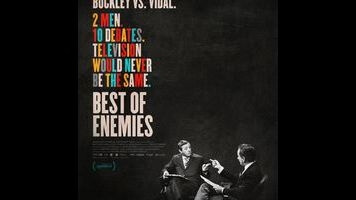Television used to value public intellectuals a lot more than it does today. In the heyday of “panel shows” like What’s My Line? and To Tell The Truth, TV’s idea of a celebrity included Broadway impresarios, publishing magnates, newspaper columnists, and any man or woman who could quip knowledgeably about current events. It was in this environment that William F. Buckley and Gore Vidal became household names. Two patrician New Yorkers with strong political convictions and dryly combative personalities, Buckley and Vidal became go-to TV guests even though—or perhaps because—they reveled in asserting their moral and academic superiority when the camera pivoted their way.
Robert Gordon and Morgan Neville’s alternately entertaining and unsettling documentary Best Of Enemies looks at both of these men’s lives through the prism of a moment when their paths infamously crossed. In 1968, ABC News—a distant third in the ratings behind CBS and NBC—compensated for its inability to provide gavel-to-gavel coverage of the Republican and Democratic conventions by offering a series of spirited debates between Buckley and Vidal. At the time, both men had recently suffered resounding defeats in their attempts to run for political office, but both were phenomenally successful in other fields: Buckley as the host of the right-wing talk show Firing Line, and Vidal as the author of best-selling books like the scandalous Myra Breckenridge. Neither man respected the other. Buckley considered Vidal a degenerate panderer, while Vidal thought Buckley was making callous neo-fascism palatable to a mass audience. In other words: They had a lot to talk about.
And yet the 1968 debates are mostly remembered for 10 searing seconds, from the Chicago round. During Miami’s Republican convention, Vidal had thrown Buckley off his game, baiting him with contradictory quotes from his own columns and speeches, and leaving Buckley to slam Myra Breckenridge as a snide, weak dismissal of Vidal in general. For Chicago’s Democratic convention, Buckley came more prepared, and as the national controversy over the local police’s treatment of protestors mounted, the National Review founder launched into a cogent critique of the agitators. Then Vidal interjected, calling him “a pro- or crypto-Nazi,” and Buckley leaned forward and hissed, on live television, “Now listen you queer, stop calling me a crypto-Nazi or I’ll sock you in your goddamn face and you’ll stay plastered.”
Best Of Enemies lingers over that outburst, showing it multiple times, and registering opinions from people who knew each man. What makes this film so vital is that Gordon and Neville themselves have a distinct opinion about the moment’s significance—both to Buckley and Vidal and to the future direction of political commentary on television. Buckley was embarrassed while Vidal was smug, both realizing that the former’s loss of temper was also a loss of the high ground. Profanity aside though, TV news ignored ABC anchor Howard K. Smith’s in-the-moment admonition that Buckley and Vidal had provided “a little more heat and a little less light.” Soon each network started programming their own versions of left-versus-right shouting matches. The end result? The evolution of political discourse into a team sport, where cable news in particular encourages liberals and conservatives to spend more time tearing down their opponents than seeking compromise.
Gordon and Neville don’t do anything fancy with the archival-footage-and-talking-heads format here, aside from having Kelsey Grammer read from Buckley’s memoirs of the event, and John Lithgow read Vidal’s. (A debate between the actual Grammar and Lithgow would probably make good television, too.) But in the years they spent piecing this film together, they got some strong voices on the record, including the late Christopher Hitchens, the now-semi-retired Andrew Sullivan, and the inevitable Dick Cavett—the latter of whom takes a long pause after the initial clip of the Buckley rant before muttering, “The network nearly shat.” Once again, it’s telling just how much material there is to draw from, because Buckley and Vidal happened to be around at a time when TV liked guys who were willing to show off their smarts.
It’s also notable how little has changed in the what political commentators argue about. Vietnam isn’t a hot-button issue any more, but Buckley and Vidal were batting around the still-burning topics of sexual morality, income inequality, and how “law and order” could be a code word for institutional racism. More importantly, both men were passionate and articulate about these subjects, unlike so many people on TV today, who seem to be playing a role for ratings. These two might’ve elevated the conversation, but neither could resist getting cute—Buckley with his flashes of macho swagger, and Vidal with his withering insults about Buckley’s “slightly Latinate and inaccurate style.” The fascination and tragedy of Best Of Enemies is that these two great minds squandered what might’ve been their best chance to show the broadcast media how to have a vigorous, entertaining, useful argument about where the country was headed.

